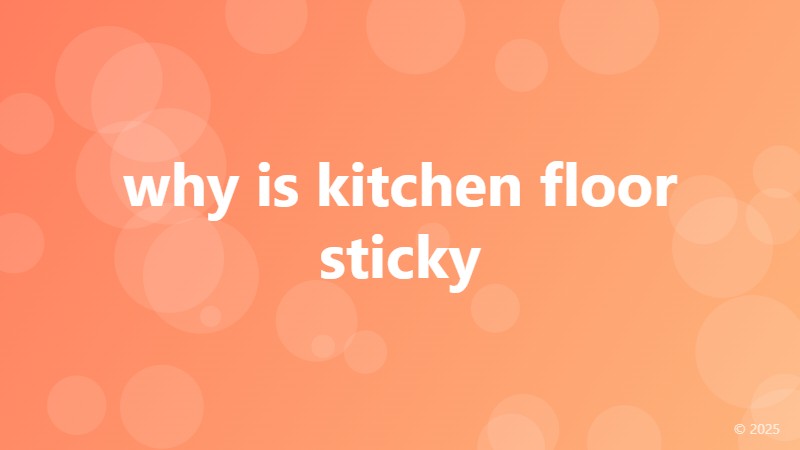why is kitchen floor sticky

Understanding the Culprits Behind Your Sticky Kitchen Floor
Have you ever found yourself stuck to the kitchen floor, quite literally? A sticky kitchen floor can be frustrating and annoying, especially when you're trying to cook up a storm or clean up after a meal. But why does this happen, and more importantly, how can you prevent it?
The Usual Suspects: Common Causes of a Sticky Kitchen Floor
Before we dive into the solutions, let's take a look at the common culprits behind your sticky kitchen floor:
Spills and messes are a given in the kitchen, but when they're not cleaned up promptly, they can leave behind a sticky residue. This is especially true for sugary substances like honey, syrup, and fruit juice. Grease and oil from cooking can also contribute to a sticky floor, as can pet accidents or dirty foot traffic.
In addition to these obvious culprits, there are some less obvious reasons why your kitchen floor might be sticky. For example, if you have a hardwood or laminate floor, it may be due for a good cleaning and re-coating. Similarly, if you've recently mopped your floor with a dirty mop or dirty cleaning solution, you may be inadvertently spreading dirt and grime around, making your floor sticky.
The Role of Cleaning Products in a Sticky Kitchen Floor
Cleaning products can sometimes do more harm than good, especially when it comes to your kitchen floor. Many commercial cleaning products contain harsh chemicals that can leave behind a sticky residue. This is especially true for floor cleaners that contain wax or other substances designed to leave a glossy finish.
If you're using a cleaning product that's leaving your floor sticky, it may be time to switch to a different brand or type of cleaner. Look for products that are specifically designed for your type of flooring and that are labeled as "non-stick" or "residue-free."
Preventing a Sticky Kitchen Floor: Tips and Tricks
So, how can you prevent your kitchen floor from becoming sticky in the first place? Here are a few tips and tricks to get you started:
Sweep or vacuum your floor regularly to remove dirt and debris. This will help prevent dirt from getting ground into the floor and making it sticky.
Mop your floor with a clean mop and cleaning solution specifically designed for your type of flooring. Avoid using too much water, as this can damage certain types of flooring.
Clean up spills and messes immediately to prevent them from becoming sticky. If you do spill something, try to clean it up right away with a damp cloth or paper towel.
Consider investing in a sticky floor cleaner or a product specifically designed to remove sticky residue from your kitchen floor.
By understanding the common causes of a sticky kitchen floor and taking steps to prevent it, you can keep your kitchen clean, safe, and sticky-free.